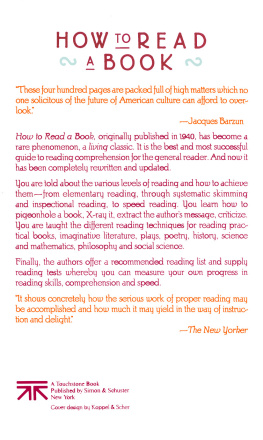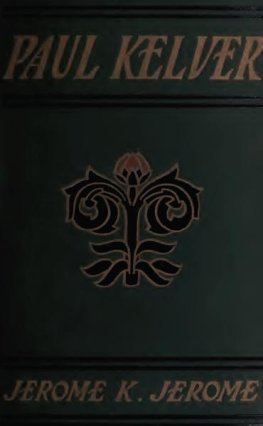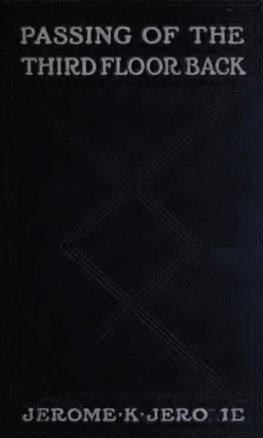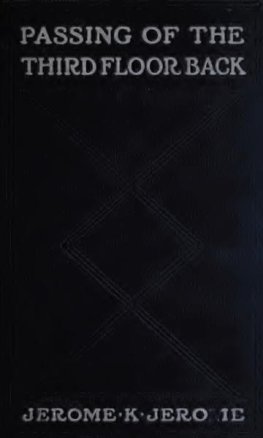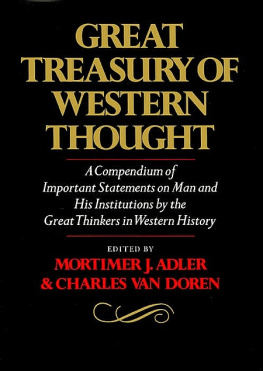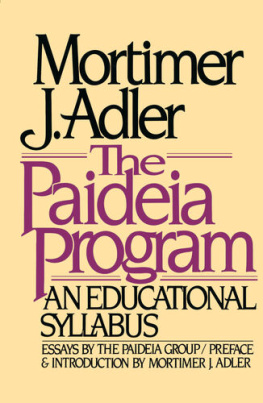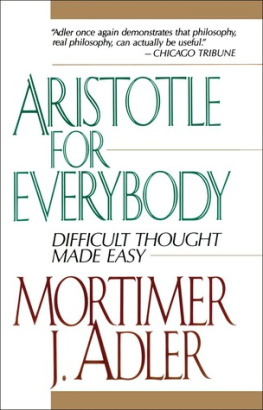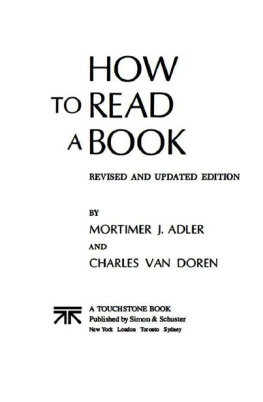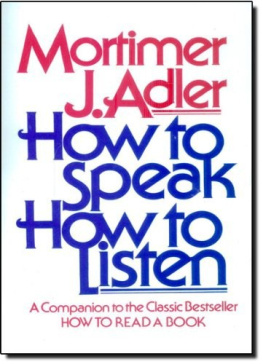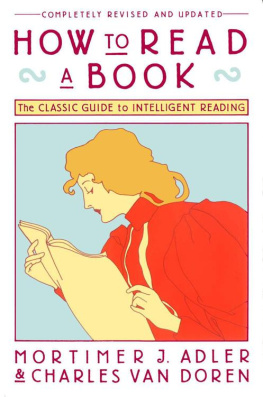Adler Mortimer Jerome - How to Read a Book
Here you can read online Adler Mortimer Jerome - How to Read a Book full text of the book (entire story) in english for free. Download pdf and epub, get meaning, cover and reviews about this ebook. City: New York;N.Y, year: 2014;1972, publisher: Simon & Schuster;Touchstone, genre: Detective and thriller. Description of the work, (preface) as well as reviews are available. Best literature library LitArk.com created for fans of good reading and offers a wide selection of genres:
Romance novel
Science fiction
Adventure
Detective
Science
History
Home and family
Prose
Art
Politics
Computer
Non-fiction
Religion
Business
Children
Humor
Choose a favorite category and find really read worthwhile books. Enjoy immersion in the world of imagination, feel the emotions of the characters or learn something new for yourself, make an fascinating discovery.
- Book:How to Read a Book
- Author:
- Publisher:Simon & Schuster;Touchstone
- Genre:
- Year:2014;1972
- City:New York;N.Y
- Rating:5 / 5
- Favourites:Add to favourites
- Your mark:
- 100
- 1
- 2
- 3
- 4
- 5
How to Read a Book: summary, description and annotation
We offer to read an annotation, description, summary or preface (depends on what the author of the book "How to Read a Book" wrote himself). If you haven't found the necessary information about the book — write in the comments, we will try to find it.
How to Read a Book — read online for free the complete book (whole text) full work
Below is the text of the book, divided by pages. System saving the place of the last page read, allows you to conveniently read the book "How to Read a Book" online for free, without having to search again every time where you left off. Put a bookmark, and you can go to the page where you finished reading at any time.
Font size:
Interval:
Bookmark:
A RECOMMENDED READING LIST
On the following pages appears a list of books that it would be worth your while to read. We mean the phrase worth your while quite seriously. Although not all of the books listed are great in any of the commonly accepted meanings of the term, all of them will reward you for the effort you make to read them. All of these books are over most peoples headssufficiently so, at any rate, to force most readers to stretch their minds to understand and appreciate them. And that, of course, is the kind of book you should seek out if you want to improve your reading skills, and at the same time discover the best that has been thought and said in our literary tradition.
Some of the books are great in the special sense of the term that we employed in the last chapter. On returning to them, you will always find something new, often many things. They are endlessly re-readable. Another way to say this is that some of the bookswe will not say exactly how many, nor will we try to identify them, since to some extent this is an individual judgmentare over the heads of all readers, no matter how skillful. As we observed in the last chapter, these are the works that everyone should make a special effort to seek out. They are the truly great books; they are the books that anyone should choose to take with him to his own desert island.
The list is long, and it may seem a little overwhelming. We urge you not to allow yourself to be abashed by it. In the first place, you are likely to recognize the names of most of the authors. There is nothing here that is so recondite as to be esoteric. More important, we want to remind you that it is wise to begin with those books that interest you most, for whatever reason. As we have pointed out several times, the primary aim is to read well, not widely. You should not be disappointed if you read no more than a handful of the books in a year. The list is not something to be gotten through in any amount of time. It is not a challenge that you can meet only by finishing every item on it. Instead, it is an invitation that you can accept graciously by beginning wherever you feel at home.
The authors are listed chronologically, according to the known or supposed date of their birth. When several works of an author are listed, these too are arranged chronologically, where that is possible. Scholars do not always agree about the first publication of a book, but this need not concern you. The point to remember is that the list as a whole moves forward through time. That does not necessarily mean that you should read it chronologically, of course. You might even start with the end of the list and read backward to Homer and the Old Testament.
We have not listed all the works of every author. We have usually cited only the more important titles, selecting them, in the case of expository books, to show the diversity of an authors contribution to different fields of learning. In some instances, we have listed an authors Works and specified, in brackets, those titles that are especially important or useful.
In drawing up a list of this kind, the greatest difficulty always arises with respect to the relatively contemporary items. The closer an author is to our own time, the harder it is to exercise a detached judgment about him. It is all very well to say that time will tell, but we may not want to wait. Thus, with regard to the more recent writers and books, there is much room for differences of opinion, and we would not claim for the later items on our list the degree of authority that we can claim for the earlier ones.
There may be differences of opinion about some of the earlier items too, and we may be charged with being prejudiced against some authors that we have not listed at all. We are willing to admit that this may be true, in some cases. This is our list, and it may differ in some respects from lists drawn up by others. But it will not differ very significantly if everyone concurs seriously in the aim of making up a reading program that is worth spending a lifetime on. Ultimately, of course, you should make up your own list, and then go to work on it. It is wise, however, to read a fair number of the books that have been unanimously acclaimed before you branch off on your own. This list is a place to begin.
We want to mention one omission that may strike some readers as unfortunate. The list contains only Western authors and books; there are no Chinese, Japanese, or Indian works. There are several reasons for this. One is that we are not particularly knowledgeable outside of the Western literary tradition, and our recommendations would carry little weight. Another is that there is in the East no single tradition, as there is in the West, and we would have to be learned in all Eastern traditions in order to do the job well. There are very few scholars who have this kind of acquaintance with all the works of the East. Third, there is something to be said for knowing your own tradition before trying to understand that of other parts of the world. Many persons who today attempt to read such books as the I Ching or the Bhagavad-Gita are baffled, not only because of the inherent difficulty of such works, but also because they have not learned to read well by practicing on the more accessible worksmore accessible to themof their own culture. And finally, the list is long enough as it is.
One other omission requires comment. The list, being one of books, includes the names of few persons known primarily as lyric poets. Some of the writers on the list wrote lyric poems, of course, but they are best known for other, longer works. This fact is not to be taken as reflecting a prejudice on our part against lyric poetry. But we would recommend starting with a good anthology of poetry rather than with the collected works of a single author. Palgraves The Golden Treasury and The Oxford Book of English Verse are excellent places to start. These older anthologies should be supplemented by more modern onesfor example, Selden Rodmans One Hundred Modern Poems, a collection widely available in paperback that extends the notion of a lyric poem in interesting ways. Since reading lyric poetry requires special skill, we would also recommend any of several available handbooks on the subjectfor example, Mark Van Dorens Introduction to Poetry, an anthology that also contains short discussions of how to read many famous lyrics.
We have listed the books by author and title, but we have not attempted to indicate a publisher or a particular edition. Almost every work on the list is available in some form, and many are available in several editions, both paperback and hard cover. However, we have indicated which authors and titles are included in two sets that we ourselves have edited. Titles included in Great Books of the Western World are identified by a single asterisk; authors represented in Gateway to the Great Books are identified by a double asterisk.
1. Homer (9th century B.C.?)
* lIiad
*Odyssey
2. The Old Testament
3. Aeschylus (c. 525-456 B.C.)
* Tragedies
4. Sophocles (c. 495-406 B.C.)
* Tragedies
5. Herodotus (c. 484-425 B.C.)
*History (of the Persian Wars)
6. Euripides (c. 485-406 B.C.)
* Tragedies (esp. Medea, Hippolytus, The Bacchae)
7. Thucydides (c. 460-400 B.C.)
* History of the Peloponnesian War
8. Hippocrates (c. 460-377? B.C.)
* Medical writings
9. Aristophanes (c. 448-380 B.C.)
* Comedies (esp. The Clouds, The Birds, The Frogs)
10. Plato (c. 427-347 B.C.)
* Dialogues (esp. The Republic, Symposium, Phaedo, Meno, Apology, Phaedrus, Protagoras, Gorgias, Sophist, Theaetetus)
Font size:
Interval:
Bookmark:
Similar books «How to Read a Book»
Look at similar books to How to Read a Book. We have selected literature similar in name and meaning in the hope of providing readers with more options to find new, interesting, not yet read works.
Discussion, reviews of the book How to Read a Book and just readers' own opinions. Leave your comments, write what you think about the work, its meaning or the main characters. Specify what exactly you liked and what you didn't like, and why you think so.

